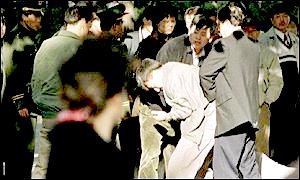



China escapes UN rights censure
A Falun Gong member is arrested outside of the Great Hall of the People. The UN's top human rights body has agreed not to debate a resolution condemning China for alleged human rights abuses.
The US-sponsored
resolution at the United Nations Commission on Human Rights was cancelled
after a
"no-action"
motion was voted through.
As in previous years, Beijing managed to head off full-scale discussion and formal criticism of its record.
The US, which had pushed hard for a vote, has been critical of a number of countries including Britain for taking a softer line on China.
The "no-action" motion was passed by a vote of 22-18 against with 12 abstentions.
China has accused the US of harbouring anti-China sentiment - and has angrily rebuffed criticisms of its ban and crackdown on the Falun Gong spiritual movement.
Last
week a senior Chinese official held a special news conference in Geneva
to rebuff criticisms of the
suppression
of the movement.
China
banned the group after it held a silent protest outside government headquarters,
against being
labelled
superstitious.
'Evil cult'
Beijing says Falun Gong is an evil cult which plotted to overthrow the government, and caused the deaths of more than 1,400 people by urging its followers not to use medicine.
Practitioners
say the movement, based on Qigong breathing exercises and Buddhist meditation,
is
merely
a peaceful form of spiritual cultivation.
Several
leading members have been jailed for up to 18 years; human rights groups
say hundreds more
have
been sent without trial or labour re-education.
China
has promised to use only friendly persuasion to urge ordinary Falun Gong
practitioners, many of
them
elderly or middle aged, to give up the practice.
It has
admitted that several practitioners have died in police custody but says
their deaths resulted from natural causes or suicide. And it says that
the clampdown on Falun Gong has actually benefited
believers
in China's five officially sanctioned religions.
State control of worship
Beijing also faces criticism from members of Zhonggong, another outlawed Qigong group - as well as from followers of Christian groups which reject state authority over worship.
Overall
China argues that a developing country must place the rights to subsistence
and development
above
individual rights. But it is also seeking to emphasise reforms in its legal
system.
A Chinese
newspaper on Monday highlighted a case in which a policeman was given a
suspended death
sentence,
and another jailed for life, after they tortured a suspect to death.
It said these were the stiffest sentences ever handed down in such a case.
The report came on the day human rights groups alleged that a Shanghai based dissident, Yao Zhenxiang, had been sent for two years of labour and re-education, accused of consorting with prostitutes, after setting out for a meeting of democracy activists.
Similar charges have been used against a number of other dissidents.